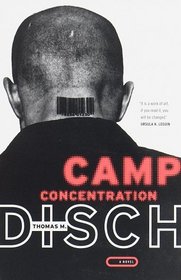Helpful Score: 2
Disturbing book of a militaristic society gone bad and performing medical experiments on its own citizens. Political prisoners are induced to become hyper-intelligent, but this slowly drives them mad, while the powers that be watch idly. Paranoid, clautrophobia-inducing, and deeply weird. If you like Philip Dick or Stanislaw Lem, you're likely to enjoy this greatly.
Helpful Score: 2
Deep, philosophical, meditative book
The USA is governed by a hard-line right-wing administration, which exploits all of its supporters' worst fears and fantasies. The country is engaged in an interminable war, against enemies old and new, and one-time friends. The President has just decided that "tactical" nuclear weapons might just give him the "hitting power" that he and his supporters yearn for.
And this was written in 1968.
Thomas M. Disch -- poet, critic and SF/Fantasy novelist extraordinaire -- makes no efforts to ingratiate himself in this bleak, yet (SPOILER!?) ultimately hopeful account of an alternative 1970s (that, as I point out above) sounds awfully familiar. His central character and narrator Louis Sacchetti is (let me see if I can cover everything) obnoxious, smug, racist, homophobic and completely complacent in his own superiority. I only wish I were smarter, so I could be certain that Louie's philosophical and "high-intellectual" ramblings are as silly and misinformed as his execrable poetry. (Remember that Disch, as I said, was a well-regarded poet. It takes real talent to write drivel as bad as the early example of Louie's poetry we are given ...) Reviewers who complain that Louis is Not a Nice Person are, I am positive, missing the point -- that is exactly the reaction that Disch wants of his reader, so that Louie's journey, and narrative arc, can be all the more startling.
Having been sent to prison for five years, for refusing military service in the Government's endless wars-- an uncharacteristically selfless gesture that he is deeply regretting -- Louie finds himself enlisted as an observer to a grim medical experiment that uses a mutant strain of syphilis to exponentially increase intelligence and creative thought. The catch -- and oh, yes, there is a catch -- it kills you, messily and painfully, in less than a year. And then, Louie makes a really startling discovery ...
Can I just say, in as non-spoilerish a way as I possibly can, that if you find offputting Louie's obnoxious character, and the high-blown flights of (possibly bogus) intellectualising that Disch allows him to indulge, and find this short novel a bit of hard work at the start, please do soldier on. The trip is worth it. This is "Flowers for Algernon" for grownups -- and the ending is a real trip ...
And this was written in 1968.
Thomas M. Disch -- poet, critic and SF/Fantasy novelist extraordinaire -- makes no efforts to ingratiate himself in this bleak, yet (SPOILER!?) ultimately hopeful account of an alternative 1970s (that, as I point out above) sounds awfully familiar. His central character and narrator Louis Sacchetti is (let me see if I can cover everything) obnoxious, smug, racist, homophobic and completely complacent in his own superiority. I only wish I were smarter, so I could be certain that Louie's philosophical and "high-intellectual" ramblings are as silly and misinformed as his execrable poetry. (Remember that Disch, as I said, was a well-regarded poet. It takes real talent to write drivel as bad as the early example of Louie's poetry we are given ...) Reviewers who complain that Louis is Not a Nice Person are, I am positive, missing the point -- that is exactly the reaction that Disch wants of his reader, so that Louie's journey, and narrative arc, can be all the more startling.
Having been sent to prison for five years, for refusing military service in the Government's endless wars-- an uncharacteristically selfless gesture that he is deeply regretting -- Louie finds himself enlisted as an observer to a grim medical experiment that uses a mutant strain of syphilis to exponentially increase intelligence and creative thought. The catch -- and oh, yes, there is a catch -- it kills you, messily and painfully, in less than a year. And then, Louie makes a really startling discovery ...
Can I just say, in as non-spoilerish a way as I possibly can, that if you find offputting Louie's obnoxious character, and the high-blown flights of (possibly bogus) intellectualising that Disch allows him to indulge, and find this short novel a bit of hard work at the start, please do soldier on. The trip is worth it. This is "Flowers for Algernon" for grownups -- and the ending is a real trip ...




![header=[] body=[Get a free book credit right now by joining the club and listing 5 books you have and are willing to share with other members!] Help icon](/images/question.gif?v=90afaeb39)
